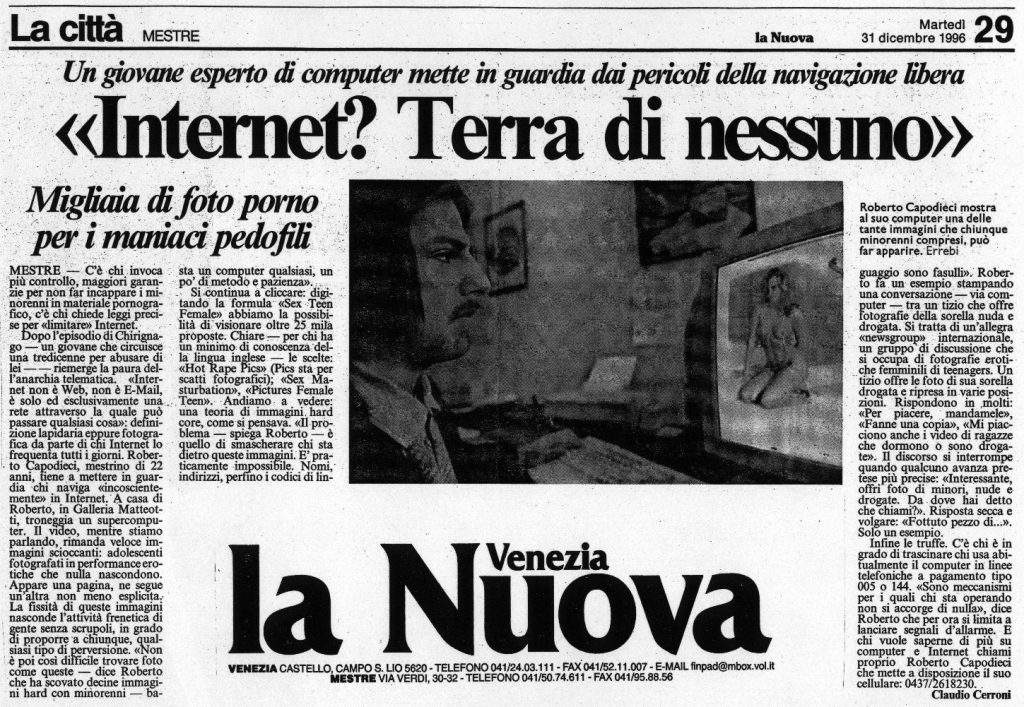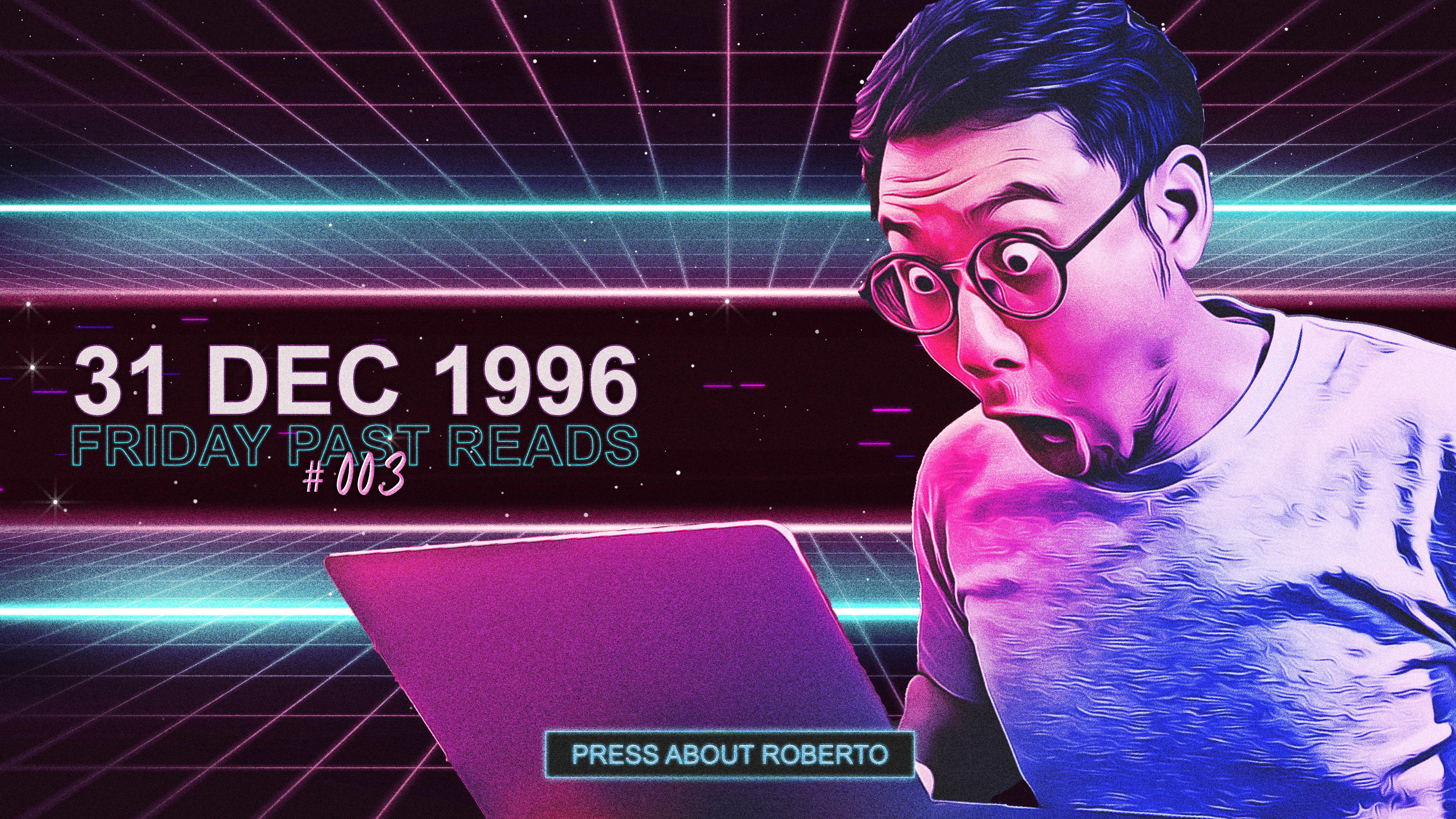At age 22, I been interviewed about this new thing, the Internet. As slowly people starts using Internet I am warning of the potential dangers one can meet online. How easy is to access any sort of material in a (at the time) unregulated space that was becoming easy to use, and open also to minors. As father of (at the time) a 4 years old, that was already able to manage a computer, I thought how needed was to inform the older generation of what accessing Internet meant.


English (translated) > Clicca qui per versione Italiana
A young computer expert warns of the dangers of surfing the internet
“Internet? No man’s land”
Thousands of pornographic images for pedophile maniacs
Mestre. Some call for more control, more guarantees to prevent under-age kids from gaining access to pornographic material and some even demand precise legislation to “limit” the internet.
After the episode of Chirignago – a youth cajoling a thirteen year old in order to sexually abuse her – the fear of online anarchy returns. “Internet is not the Web, is not the E-mail, it is only and exclusively a net through which anything can pass”. A pithy statement and yet very clear to those who surf the net every day. Roberto Capodieci a twenty-two year old from Mestre wants to warn those “irresponsible” internet surfers. In Roberto’s house in Galleria Matteotti a super computer dominates the room. While we talk the video sends fast and shocking images: adolescents photographed in very explicit erotic performances. A page appears, followed by another equally explicit. The fixed screen images hide the frenetic activity of unscrupulous people, capable of offering to anyone any type of perversion. “It is not that difficult to find photos like these –says Roberto who has dug up tens of hard core images involving minors – all you need is a computer, a bit of methodology and patience”.
He continues to click: typing the key words “Sex Teen Female” and we have the opportunity to visualize 25,000 postings. For those with a minimum of English knowledge, the choices are clear: “Hot Rape Pics”, “Sex Masturbation”, “Pictures Female Teens”. We go and have a look: just as we thought, a plethora of hard core images comes up. “The problem – explains Roberto – is to uncover who is behind these images. It is practically impossible. Names, addresses, even the language codes are fake”. Roberto gives an example by printing a conversation – via computer – with an individual that offers photographs of his naked and drugged sister. It is a seemingly innocuous international “newsgroup”, a discussion group dealing with erotic teenage female photographs. An individual offers photographs of his naked and drugged sister in various positions. Many reply: “Please send them to me”, “make copies”, “I also like the videos of girls sleeping or drugged”. The conversation ends abruptly when someone asks a more pointed question: “Interesting you offer photos of minors naked and drugged. Where did you say you are calling from?” The dry and vulgar reply arrives in no time: “Fucking piece of …”. Just an example.
Then there are the scams. Some are able to drag people who use the computer regularly into paying telephone lines like 005 or 144.”They are mechanisms that the person operating a computer is not aware of” says Roberto that for the time being is just sending warning signals. And if you want to know more about computers and internet you can contact Roberto Capodieci on his cellphone: 0437/2618230. [NOTE: number no more active]
Claudio Cerroni
Italiano (lingua originale) > Click here for English version
Un giovane esperto di computer mette in guardia dai pericoli della navigazione libera
“Internet? Terra di nessuno”
Migliaia di foto porno per i maniaci pedofili
Mestre. C’è chi invoca più controllo, maggiori garanzie per non far incappare i minorenni in materiale pornografico, c’è chi chiede leggi precise per <<limitare>> Internet.
Dopo l’episodio di Chirignago – un giovane che circuisce una tredicenne per abusare di lei – riemerge la paura dell’anarchia telematica. <<Internet non è Web, non è E-Mail, è solo ed esclusivamente una rete attraverso la quale può passare qualsiasi cosa>>: definizione lapidaria eppure fotografica da parte di chi Internet lo frequenta tutti i giorni. Roberto Capodieci, mestrino di 22 anni, tiene a mettere in guardia chi naviga <<incoscientemente>> in Internet. A casa di Roberto, in Galleria Matteotti, troneggia un supercomputer. Il video, mentre stiamo parlando, rimanda veloce immagini scioccanti: adolescenti fotografati in performance erotiche che nulla nascondono. Appare una pagina, ne segue un’altra non meno esplicita. La fissità di queste immagini nasconde l’attività frenetica di gente senza scrupoli, in grado di proporre a chiunque, qualsiasi tipo di perversione. <<Non è poi così difficile trovare foto come queste – dice Roberto che ha scovato decine immagini hard con minorenni – basta un computer qualsiasi, un po’ di metodo e pazienza>>.
Si continua a cliccare: digitando la formula <<Sex Teen Female>> abbiamo la possibilità di visionare oltre 25 mila proposte. Chiare – per chi ha un minimo di conoscenza della lingua inglese – le scelte: <<Hot Rape Pics>> (Pics sta per scatti fotografici); <<Sex Masturbation>>, <<Pictures Female Teen>>. Andiamo a vedere: una teoria di immagini hard core, come si pensava. <<Il problema – spiega Roberto – è quello di smascherare chi sta dietro queste immagini. E’ praticamente impossibile. Nomi, indirizzi, perfino i codici di linguaggio sono fasulli>>. Roberto fa un esempio stampando una conversazione – via computer – tra un tizio che offre fotografie della sorella nuda e drogata. Si tratta di una allegra <<newsgroup>> internazionale, un gruppo di discussione che si occupa di fotografie erotiche femminili di teenagers. Un tizio offre le foto di sua sorella drogata e ripresa in varie posizioni. Rispondono in molti: <<Per piacere, mandamele>>, <<Fanne una copia>>, <<Mi piacciono anche i video di ragazze che dormono o sono drogate. Da dove hai detto che chiami?>>. Risposta secca e volgare: <<Fottuto pezzo di m…>>. Solo un esempio.
Infine le truffe. C’è chi è in grado di trascinare chi usa abitualmente il computer in linee telefoniche a pagamento tipo 005 o 144. <<Sono meccanismi per i quali chi sta operando non si accorge di nulla>>, dice Roberto che per ora si limita a lanciare segnali d’allarme. E chi vuole saperne di più su computer ed Internet chiami proprio Roberto Capodieci che mette a disposizione il suo cellulare: 0437/2618230 [NOTA: Numero non più attivo]
Claudio Cerroni

